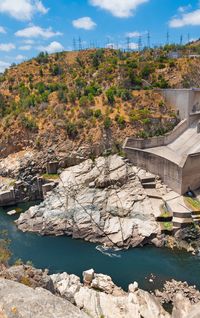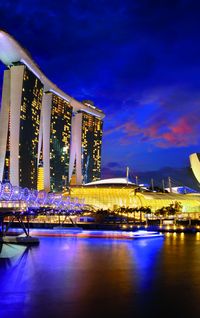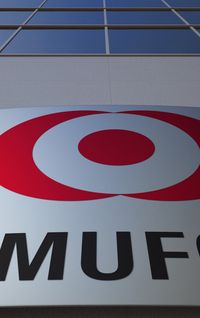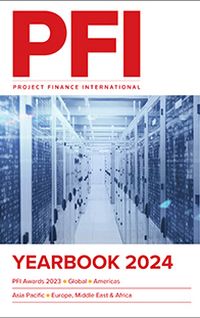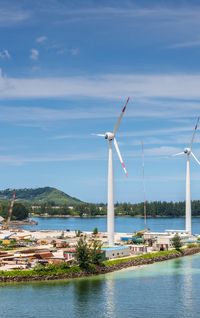AESC’s Douai gigafactory project financing prises the door open a little further for battery manufacturers. Verkor, Prologium, ACC and more are lining up further deals as Europe looks to become the energy transition’s factory. By Jordan Bintcliffe.
Japan-headquartered battery manufacturer Automotive Energy Supply Corporation (AESC) has raised a €986m debt package from commercial lenders and the European Investment Bank to fund construction of its €1.31bn battery factory at Douai in northern France, and at least three more gigafactories are in the pipeline for the region. Project SPV Envision AESC France signed on the financing and general syndication took place in late September with close occurring on October 18, according to a source.
The debt of AESC, formerly Envision AESC, on the gigafactory is backed by Renault’s agreement to offtake 100% of production in the first phase. Renault’s offtake is shorter than the 11.5-year average tenor on the term loans and a cash sweep will kick in once the project begins operating to compensate for this. The sweep will be lifted if AESC renews the contract with Renault.
Commercial banks BBVA, Santander, BNP Paribas, HSBC, Natixis and Societe Generale are lending a total €463.3m, including a €158.8m term loan covered by French public investment bank Bpifrance and a €165m term loan covered by Chinese ECA Sinosure – AESC is 80% owned by Chinese renewable energy company Envision Group. Sinosure’s involvement is tied to the use of equipment from Chinese OEMs and offers 95% cover.
The debt package has a €100m uncovered working capital facility, a €20m uncovered VAT facility, and a €19.5m uncovered standby letter of credit facility. All of the debt has an 11-year tenor, apart from the VAT facility which is four years. Both the Bpifrance and Sinosure-backed term loans have 3.5-year grace periods and are amortising. The standby letter of credit is amortising but has no grace period, and the working capital and VAT facilities have bullet repayments.
The EIB’s €450m funding comprises a €317.7m term loan and €19.5m standby loan, both direct lending – and €112.8m of indirect funding support to commercial banks, improving their terms. All of the debt is senior bar a final €73m piece of subordinated, mezzanine debt from Caisse des Depots et Consignations (CDC) unit Banque des Territoires.
A real estate financing had been considered, with CDC’s preference to take an equity stake, but mixing project and real estate finance structures was difficult and overly complex. Ultimately the participants opted for a project financing to reduce complexity, with CDC instead taking part in the subordinated debt, and the project banked on its cashflow. All-in pricing ranges from 250bp to 350bp above Euribor. The term loans were swapped 90% as the project moved to close.
AESC’s factory located at Renault’s Douai site will have the capacity to produce 9GWh of batteries per year. Operations are expected to begin in 2024. Societe Generale provided financial advice to AESC alongside legal advice from Allen & Overy. The lenders were advised by Linklaters, DLA Piper, and Milbank.
The deal may be the first time that Sinosure has provided coverage on a French transaction. It might mark a reversal from trends seen in recent decades, one source said, where China has been the world’s factory. “Rather than tech and capital moving to China, it’s an Asian sponsor moving to France, bringing the technology and hiring French workers,” the source said.
Capacity at the factory will be gradually increased through three expansion projects to reach 24GWh–30GWh per year by 2030, reduced from the 43GWh previously announced, according to a report. The reduction is due to a decision to build the factory on a car park adjacent to Renault’s assembly line, rather than in a wooded area that would have needed permission because of species protection.
Renault has an offtake agreement to buy the “new generation of lithium-ion batteries for electric vehicles”, the EIB said, and will use them in its Renault ECHO (R5) and 4Ever models. Future phases of the gigafactory will also be able to supply other automotive and industrial manufacturers.
InvestEU is supporting the financing. “The increased risk profile of the loans (loan tenor potentially going beyond the Renault offtake contract and being exposed to a mix of substantial market/technology/offtaker creditworthiness risks, subject to acceptability being confirmed during appraisal) beyond what the bank traditionally regards as acceptable, can be considered thanks to InvestEU protection,” the EIB said.
The plant will deliver enough batteries to power 100,000 electric vehicles annually and serve the Nissan car plant in Sunderland in the UK. The financing is expected to be similar to that on the Northvolt deal in Sweden, combining commercial bank debt with export credit and multilateral support. The Sunderland site already supports a 1.9GWh plant built in 2012 by Nissan.
AESC began as a joint venture between Japanese automotive manufacturer Nissan Motor, tech company NEC, and automotive parts manufacturer TOKIN. The JV was sold in 2019 to Envision with Nissan retaining 20% today.
The company recently closed on a US$1bn funding round, a report said in October, with it looking to raise more growth capital from investors before going public in the US. The company is working with advisers on a Series C round and is in talks with anchor investors including global automakers.
AESC is looking to build gigafactories in Kentucky, Ibaraki in Japan, and Extremadura in Spain – expected to be the next one it finances. The sponsor is in ongoing discussions with the Spanish government regarding potential subsidies.
It is said to be looking at project financing for its new gigafactory in Sunderland via HSBC. Turner and Townsend are providing legal advice to the sponsor. Construction started last year and should be completed in 2025. Annual capacity of the Sunderland site will be 12GWh, with room to expand to 25GWh by 2030 and then up to 35GWh.
AESC’s Douai project financing expands on the gigafactory formula put together by BNP Paribas and Morgan Stanley for the 2020 Northvolt Ett deal in Sweden. Lenders on the US$1.6bn deal included BNP Paribas, ING, Societe Generale, UniCredit, Danske Bank, IMI-Intesa Sanpaolo, Siemens Bank, Swedbank, Nordic Investment Bank, KfW IPEX-Bank, SEB, and SMBC.
There was a small amount of uncovered debt, including a US$50m term loan and a US$110m working capital facility. Both are priced at Libor +350bp and step down to 325bp on completion of construction. More uncovered commercial bank liquidity was available for the deal but Northvolt stuck with the DFI/ECA cover. Northvolt is now putting together a €5bn expansion financing for its Northvolt 2 scheme,.
The EIB is stepping up its financing of battery factories and in March 2020 the bank said it would lend €480m to LG Chem Group’s Polish subsidiary for the construction of a gigafactory in Wroclaw. The EIB’s debt covered approximately a third of the project’s total costs.
A number of European gigafactory projects are under appraisal by the bank, including support for Freyr Battery’s Norwegian factory. The EIB is considering a proposed €400m financing for Novo Energy’s gigafactory in Gothenburg, Sweden. Novo Energy is a joint venture between Northvolt and Volvo.
Electric batteries valley
The Douai project is one of four gigafactories planned in the Hauts region of France to be supported by EU subsidies, including the InvestEU guarantee. The EU Commission has referred to the area as an emerging "electric batteries valley".
French battery cell manufacturer Verkor has raised more than €2bn for its 16GWh per year production capacity battery gigafactory in Dunkirk. The amount comprises €600m of debt from the EIB, €650m of French subsidies, and a minimum of €850m in Series C funding (see PFI 753).
The EIB support package is part of a broader project finance debt-raising in progress with commercial banks alongside the EIB, Verkor said. The structure is likely to be similar to the AESC deal with support from Bpifrance to cover a portion of the debt, the source said. Bpi’s product covers 80% and is untied.
South Korean ECA K-Sure’s potential involvement could be tied to technology used in the factory. The group of commercial banks is yet to be selected and the deal could be signed by the end of the year or early in 2024.
Renault has entered a long-term commercial partnership with Verkor to offtake 12GWh of the project’s total production capacity. The car manufacturer has an option to expand the offtake agreement to the full amount of the factory’s capacity, which can be triggered before construction ends.
Societe Generale is advising Verkor with Macquarie Capital recently brought in as a co-adviser on the financing. Societe Generale confirmed it is advising AESC and Verkor on their respective projects. Macquarie Capital’s mandate is a result of Macquarie Asset Management becoming a lead investor via its Energy Transition Solutions Fund in Verkor’s Series C round. Macquarie joined the round with cornerstone investor Meridiam, which is also taking a significant stake.
Other equity backers include Renault, EQT Ventures, EIT InnoEnergy and Sibanye-Stillwater, alongside the Societe de Projets Industriels (SPI) investment fund operated by Bpifrance.
Taiwanese battery manufacturer ProLogium is planning a €5.2bn gigafactory in Dunkirk, with the European Commission in August approving French government plans to grant a €1.5bn subsidy. The location would be ProLogium’s first large-scale solid-state battery manufacturing plant outside Asia and targets production of 48GWh of battery capacity.
The €1.5bn grant would be paid according to various milestones until 2029. ProLogium is lining up loans and equity to finance the plant alongside the state incentives. The company plans to start construction in the second half of 2024 and begin production by the end of 2026.
TotalEnergies/Stellantis/Mercedes battery production joint venture Automotive Cells Company (ACC) aims to close a €3bn ECA-backed project financing of its Kaiserslautern gigafactory in Germany by year-end, according to a report. Italian ECA SACE, French public investment bank Bpifrance and Germany’s Allianz Trade, formerly Euler Hermes, are supporting financing of the 13.4GWh first phase of the project in Billy-Berclau, developed by ACC Deutschland.
ACC’s French gigafactory in Douvrin was supported by Important Projects of Common European Interest (IPCEI) funding. ACC plans to invest more than €7bn to build three gigafactories in France, Germany and Italy with the capacity to produce 40GWh of battery modules each by 2030.
The company’s Douvrin plant is due to begin operating before the end of the year. It will be followed up by the Kaiserslautern plant for 2025, and then another in Termoli, Italy, with production to begin in 2026.
To see the digital version of this report, please click here.
To purchase printed copies or a PDF of this report, please email leonie.welss@lseg.com
